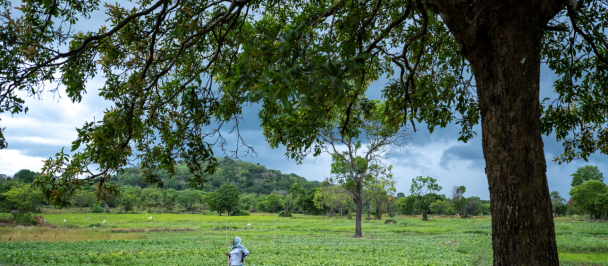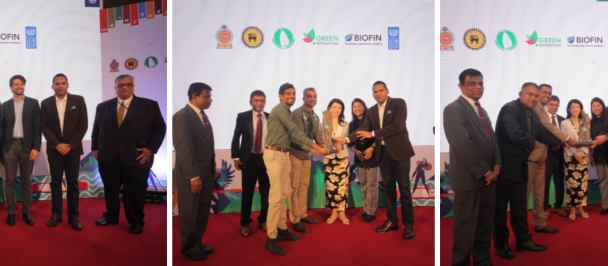UNDP supports the Government of Sri Lanka’s shift to a more nature centric investment and policy paradigm
Handing over of first ever Atlas on the Northwestern Coastal Region of Sri Lanka
March 18, 2021
L to R - Hon. Mahinda Amaraweera, Minister of Environment., Mr. Robert Juhkam, Resident Representative, UNDP in Sri Lanka & Prof. K.B. Ranawana, Coordinator, Ecological Association of Sri Lanka
Colombo, Sri Lanka, 17 March 2021: An ‘Atlas on Mangroves, Salt Marshes and Sand Dunes of the coastal area from Malwathu Oya to Pooneryn in the North Western coastal region of Sri Lanka’, was recently completed and handed over to Hon. Mahinda Amaraweera, Minister of Environment by Mr. Robert Juhkam, Resident Representative, United Nations Development Programme (UNDP) in Sri Lanka together with Dr. Anil Jasinghe, Secretary, Ministry of Environment, Prof. K.B. Ranawana, Coordinator, Ecological Association of Sri Lanka and Emeritus Prof. P. Wickramagamage, University of Peradeniya with the participation of other Ministry and UNDP officials. This first ever Atlas of the Northwestern Coastal Region of Sri Lanka, an initiative of the Small Grants Programme (SGP) funded by the Global Environment Facility (GEF), with support from UNDP and the leadership of the Government of Sri Lanka was produced to provide concise information on the sensitive ecosystems and habitats of one of the last remaining largely natural landscapes of Sri Lanka.
COVID-19 has highlighted the fragility of life on earth and in particular provides an opportunity to rethink the existing relationship with nature, on individual, societal, and political norms of business as usual.
This Atlas will inform biodiversity conservation, climate-smart livelihoods, ecotourism efforts, and will positively influence evidence-based policy making in Sri Lanka.
While undisturbed salt marshes bring migratory birds in large numbers into the North Western coastal region during the northern winter, the Palk Bay seascape which is rich in biodiversity is also home to rare species of marine mammals. Community action can restore the balance between humans and nature, and the Small Grants Programme demonstrates this, as these coastal wetland ecosystems and sand dunes benefit both humans and nature. This prevents coastal hazards such as erosion and flooding, provides habitat for migratory species and breeding grounds for coastal and marine life, and offers livelihood opportunities for local communities.
Through the GEF-SGP programme, UNDP looks to supporting the Government of Sri Lanka’s shift to a more nature centric investment and policy paradigm with a broader alliance of partners, such as the Ecological Association of Sri Lanka, to ensure the findings of this Atlas contribute towards a cleaner and greener pathway to the future of Sri Lanka.
****
L to R - Dr. Anil Jasinghe, Secretary of the Ministry of Environment, Hon. Mahinda Amaraweera, Minister of Environment, Mr. Robert Juhkam, Resident Representative, UNDP in Sri Lanka & Emeritus Prof. P. Wickramagamage, University of Peradeniya

 Locations
Locations




